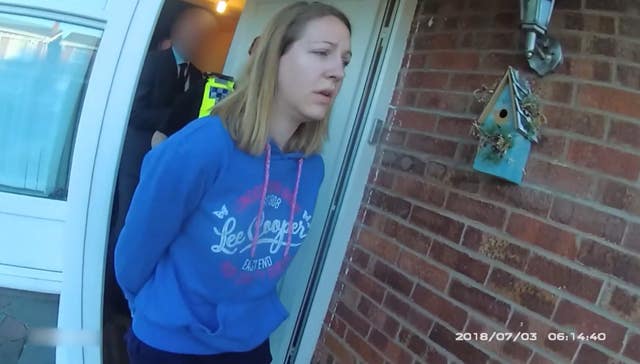Hospital manager denies saying she thought Lucy Letby investigation ‘unjust’
Ruth Millward, ex-head of risk and patient safety at the Countess of Chester Hospital, was giving evidence to the Thirlwall Inquiry.

A hospital manager has denied telling a police officer she thought it “unjust” that Lucy Letby was being investigated as a murder suspect, a public inquiry has heard.
Ruth Millward, ex-head of risk and patient safety at the Countess of Chester Hospital, told the Thirlwall Inquiry into the events surrounding Letby’s crimes that she did not recall making the comment.
The child serial killer nurse was redeployed to her department in July 2016 after all the consultants at the hospital’s neonatal unit demanded her removal, over fears she was deliberately harming babies after a series of unexpected and unexplained deaths and collapses.
Letby remained in the clerical role until she was first arrested in July 2018 by Cheshire Police, who were not brought in by the hospital to investigate until May 2017.
Last month the inquiry heard that Letby worked in a complaints office next to the risk and patient safety team, but a former employee believed she could have accessed patient notes and baby death reports.

Giving evidence on Monday, Ms Millward said “in retrospect” it would have been more appropriate to redeploy Letby to another service.
She said: “Lucy was brought into the complaints team, not into the risk and patient safety leads. She was in a different room, she was in a smaller room with my administrative staff and it was always, always expected to be a temporary thing for around eight weeks. That was my understanding.”
She said though that “events took over”, with an external review of the increased mortality rate taking longer than expected, and Letby then launching a grievance complaint against her redeployment.
Ms Millward said: “At that point to be honest I really should have said I think we need to move her now because there was no end in sight.”
She denied she took part in overheard conversations in the corridors of her department, that Letby was being made a scapegoat for poor medical care and a lack of teamworking.
Counsel to the inquiry Nicholas de la Poer KC asked: “Did you think Letby was a scapegoat?”
Ms Millward said: “No, there wasn’t sufficient information for me to make that comment. I generally thought that the unit was being run poorly, that was my view.
“I didn’t think she was necessarily being made a scapegoat. I was waiting for the invited (external) review to say what else is happening here.”
Mr de la Poer went on: “In a discussion with Cheshire Police in 2019 there is a record made by a police officer that you said you felt it was unjust that Letby was being investigated as a person of possible interest given the evidence presented by the consultants. Was that something you said to the police?”
Ms Millward replied: “I don’t believe so, no. Stating something is unjust is not words I would use. I don’t even remember having a conversation around my view of Lucy at all.”
She also told the inquiry that she thought the consultants’ opinions about Letby were not thought to have been valid because they failed to address their concerns through recognised governance routes within the hospital.
She said: “Because they bypassed all of that system and went directly to have informal conversations with the executive team through email, there is no traceability, there is no transparency, there is no critical challenge that you get from having those conversations in a wider group meeting.”
Letby, 34, from Hereford, is serving 15 whole-life orders after she was convicted at Manchester Crown Court of murdering seven infants and attempting to murder seven others, with two attempts on one of her victims, between June 2015 and June 2016.
The inquiry is expected to sit until early 2025, with findings published by late autumn of that year.





